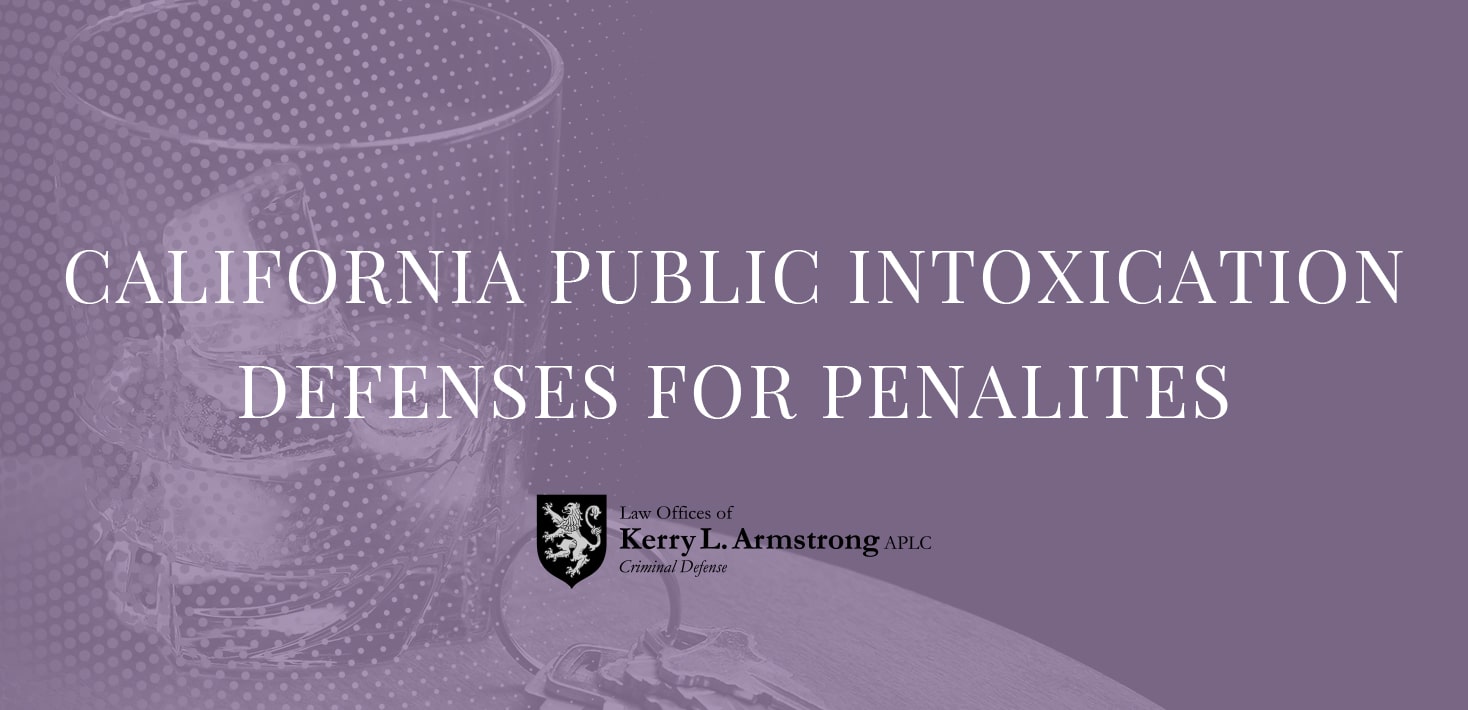
To be guilty of public intoxication, California law requires that several elements be met. Elements are the individual parts of a crime.
The California public intoxication law requires the following elements:
- The person was intoxicated;
- The person was in a public place while intoxicated;
- The person could not exercise care for their safety or the safety of others, or
- The person was obstructing, interfering with, or preventing the use of a street, sidewalk, or another public way.
The penalties for public intoxication in California include a fine, jail time, and/or probation.
However, several defenses may be available to those facing public intoxication charges.
If you were caught drunk in public, a California defense lawyer can help explain these charges and discuss defense strategies.
California Public Intoxication Law
To prove public intoxication, California prosecutors must show each of the elements listed above.
Intoxication
To be guilty of public intoxication, California law states that the person must be under the influence of drugs, alcohol, or both.
Also, to be guilty of public intoxication, the person must be willfully intoxicated. This means that the person must have voluntarily or purposely taken drugs or drank alcohol.
If you did not consume the alcohol or drugs of your own free will, you cannot be guilty of public intoxication. This could happen, for example, if someone else drugged you or slipped alcohol in your drink.
In a Public Place
A person must be in a public place to be drunk in public. California courts have defined public places as those that are open or readily accessible to anyone who wishes to go there.
Public places include businesses. The following are examples of businesses considered public places:
- Stores and shops,
- Restaurants,
- Bars and night clubs,
- Gas stations,
- Movie theaters, and
- Sports stadiums.
Other public places include:
- Sidewalks,
- Streets and highways,
- Parking lots, and
- Parks.
Even places close to a private home or residence can qualify as a public place. For example, public places near a home can include:
- Apartment or hotel hallways,
- Walkways,
- Driveways, and
- Front lawns.
Areas closed off to the public are not public places. These places can include:
- Private homes and residences,
- Fenced back yards,
- Sheds, and
- Residential garages.
Importantly, the person must be in the public place of their own free will.
For example, police officers may not command you out of your home and into a public area, and then arrest you for being intoxicated in public.
Unable to Exercise Care or Obstructs, Interferes with, or Prevents Use of a Public Way
Under the California public intoxication law, it is not enough that a person is drunk in public.
California law also requires that the person is:
- Unable to care for their safety or the safety of others, or
- Obstructing, interfering with, or preventing free use of a “street, sidewalk, or other public way.”
One example of when a person cannot care for themselves is when that person is found unconscious in a public place.
An example of obstructing, interfering with, or preventing free use of a public area can include walking in traffic.
Penalties Under California Public Intoxication Law
Public intoxication is a misdemeanor in California.
For those caught drunk in public, California courts can impose penalties that include:
- Up to 180 days (six months) in jail,
- A fine up to $1,000, and/or
- Summary probation.
These penalties become more severe for a person with multiple public intoxication convictions.
Defenses Against Public Intoxication in California
A common defense against a charge of public intoxication is to show that the prosecution has not met the elements discussed above.
For example, your defense lawyer might argue that you were:
- Not intoxicated (or involuntarily intoxicated);
- Not in a public place;
- Able to care for your safety or the safety of others; or
- Not obstructing, interfering with, or preventing free use of a public way.
Another potential defense is that the police officers violated your rights. The officer might violate your rights if the police officer stopped or arrested you without a sufficient reason.
In this case, an experienced defense lawyer could get the evidence of your public intoxication suppressed or even have the case dismissed.
Were You Caught Drunk in Public? California Criminal Defense Attorneys Can Help
If you were arrested for public intoxication, you need an experienced criminal defense lawyer to protect your rights.
At The Law Offices of Kerry L. Armstrong, APLC, our seasoned and distinguished defense lawyers are dedicated to protecting you at every stage of the case.
Contact our legal team today for a free case evaluation. Our lawyers can discuss how we can help you develop a strong legal defense and get the best possible outcome.


